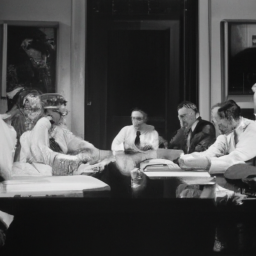In recent years, there has been a growing movement towards centrism in politics, both in the United States and Europe. This shift is driven by a desire to overcome the ideological polarization that has come to dominate political discourse, and to find common ground on issues ranging from immigration and gun control to national security and international relations.
For many, centrism represents a new hope for politics, a path towards compromise and cooperation that can help break the gridlock that has paralyzed Congress and other legislative bodies. At the same time, however, there are concerns that centrism is simply a façade for continued progressive policies, and that whatever "centrist" moves politicians make are mere window dressing for a continued progressive agenda.
One of the most prominent centrist groups in the US is No Labels, which has been active in courting centrist lawmakers in both parties. In 2019, No Labels held a summit with the Problem Solvers Caucus in Congress, where the pair praised centrism as a way to approach legislating in a divided government. The summit was seen as a sign that centrism was gaining traction in Congress, and that lawmakers were beginning to recognize the value of compromise and bipartisanship.
Similarly, the Blue Dog Coalition, a centrist group of House Democrats, is betting that it can play a lead role in cutting bipartisan deals with Republicans. The group, which has faced criticism from progressives for its willingness to work with Republicans, believes that centrism is the only way to get things done in Congress, and that ideological purity is a recipe for gridlock and inaction.
But not everyone is convinced that centrism is the answer to political polarization. Some argue that centrism is simply a watered-down version of progressivism, and that it fails to address the deep-seated ideological differences that divide the country. Others worry that centrism is a way for politicians to avoid making tough decisions and taking bold actions, and that it represents a retreat from the kind of visionary leadership that is needed to tackle the challenges of the 21st century.
One of the biggest concerns about centrism is that it can lead to a lack of accountability. If politicians are constantly compromising and seeking common ground, they can avoid taking a clear stance on important issues, and can avoid being held accountable for their actions. This can ultimately lead to a lack of transparency and a lack of trust in government, which can further erode the fabric of democracy.
Moreover, centrism can also lead to a lack of progress on important issues. If politicians are constantly seeking compromise, they may be reluctant to take bold action on contentious issues like immigration or gun control, for fear of alienating their centrist supporters. This can lead to a kind of paralysis, where politicians are unable to take decisive action on the issues that matter most to their constituents.
Despite these concerns, however, there is reason to believe that centrism can play a positive role in politics. For one thing, it can help to bridge the gap between different ideological groups, and can help to foster a greater sense of unity and cooperation. Moreover, centrism can help to break the cycle of political polarization, and can help to restore a sense of balance and moderation to political discourse.
Ultimately, whether centrism represents a new hope for politics or a mere façade for continued progressive policies remains to be seen. But one thing is clear: as political polarization continues to deepen, the need for compromise and cooperation has never been greater. If centrism can help to bring people together and foster a greater sense of unity and cooperation, then it may be the key to unlocking a brighter future for us all.
